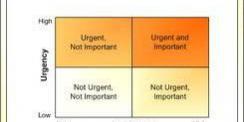Planning, time management is a skill a lot of PhD-students struggle with. In this blog a few tips on how to plan well.
On top of the chart:
Never plan more than 80% of your time.
The rest of the time will fill itself with unexpected things that need to happen: a colleague walking in, the meeting that takes longer, the things that take longer than expected.
2. Is clear for you which tasks you need to do and how these different tasks are connected?
Map it out for yourself. Divide big tasks into smaller once. Writing an article for instance can be divided into the following smaller tasks:
- summarize your literature
- get the structures of your text clear
- make sure text will be written, so free write
- make charts
- revise the literature list
- discuss your text with others
- rewrite your text
Often we focus on the urgent but not so important matters. But when do you give yourself the time to do the important things, before they become urgent?
A video on how to improve your planning with the Eisenhower-matrix:
5. Use the Warren Buffet-method
According to Warren Buffet, the multi multi billionaire, this is a good time for planning: make a list of everything you want to do today. Start with the task on top of the list. Don’t continue before you finished that task. When you finished a task, cross it off.
And maybe the most important tip: be realistic in your planning. Nothing is more frustrating than having things on your to do list you won’t be able to do. Keep that in mind whilst making a plan.
Hope this helps you to plan your time accordingly that you will have a lazy summer. Hope hearing from you if it was beneficial for you.
Do you want to receive more tips, tricks and tools? Subscribe for the newsletter and receive 244 #phd tips. Click here.




